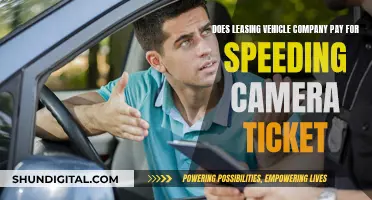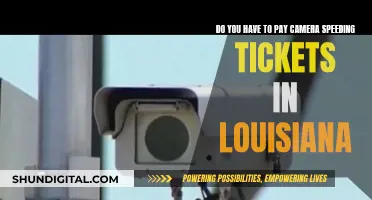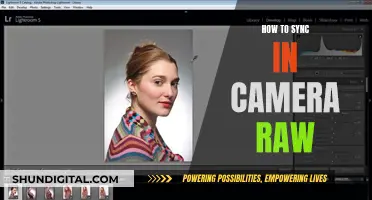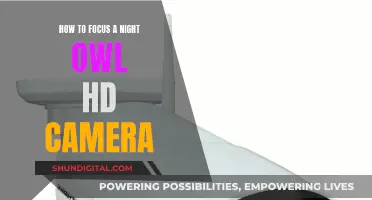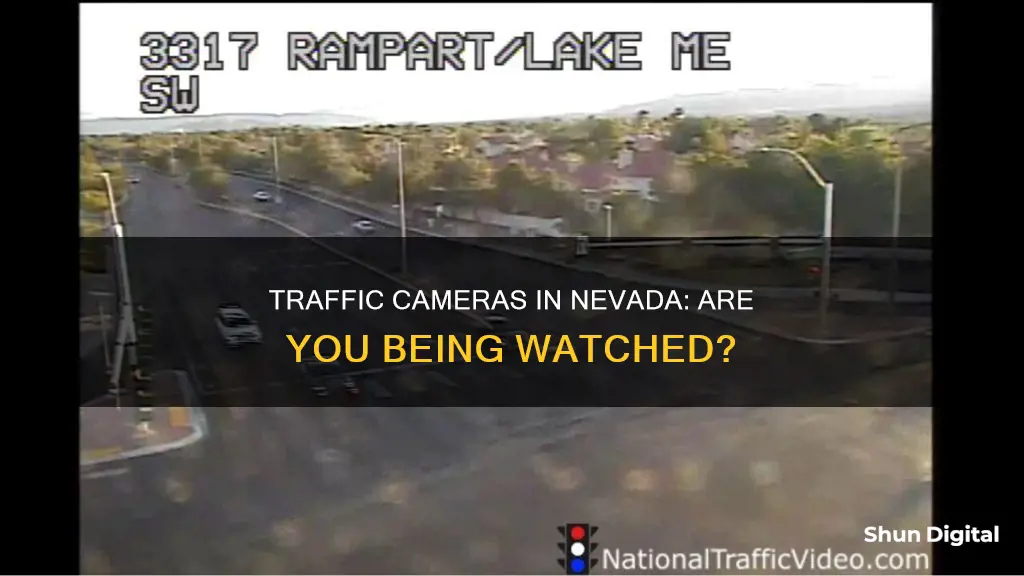
Nevada has traffic cameras installed across the state, including in Las Vegas, Sparks, and Reno. These cameras are part of the Nevada Department of Transportation's (NDOT) Intelligent Transportation Systems, which also include freeway digital message signs and Highway Advisory Radio. While these cameras provide live traffic updates and help commuters make informed decisions about their routes, they are not used for issuing traffic tickets. A 1999 state law prohibits the use of remotely controlled cameras to gather evidence against drivers who break traffic rules or are involved in accidents. Any use of traffic cameras for enforcement purposes requires a police officer to be directly connected to the camera in the field.
| Characteristics | Values |
|---|---|
| Purpose of traffic cameras | Surveillance, helping commuters and drivers make travel decisions based on road conditions |
| Use of traffic camera footage | Not recorded by government agencies, but accessible to private citizens |
| Traffic violations | No traffic tickets are issued based on camera footage |
| Red-light cameras | Prohibited by a 1999 state law |
| Traffic cameras and police | Cameras can be used if directly connected to a police officer in the field |
What You'll Learn

Nevada's traffic cameras don't record
Nevada has a network of traffic cameras in place, with nearly 1,000 cameras across southern Nevada alone. These cameras are part of the Nevada Department of Transportation's (NDOT) statewide network of Intelligent Transportation Systems, which also includes freeway digital message signs, Highway Advisory Radio, freeway ramp meters, and more. While these cameras do provide live streaming footage of traffic conditions, they do not record any video or audio information.
The Regional Transportation Commission (RTC) in southern Nevada uses these cameras to monitor freeways and major intersections. The live feeds are sent back to a traffic management center in Las Vegas, where staff can respond to crashes and delays in real time. However, the cameras are not used for recording purposes. David Swallow, RTC's deputy CEO, stated, "We don't need the video. We need live information to respond to a real-time matter."
The lack of recording from these cameras became a point of discussion after a local news station submitted a public records request for footage of a car accident but was informed that none existed. While the cameras do not record footage, they are still equipped with sensors that collect valuable data such as travel times and average speeds. This data is used to improve traffic flow and plan future infrastructure projects.
It is worth noting that there are some cameras in Nevada that do record footage, including commercial and residential security cameras, as well as some public transportation cameras. Additionally, private citizens have taken it upon themselves to record the publicly available feeds from these traffic cameras, creating their own systems to do so. However, when it comes to the official traffic cameras in Nevada, particularly in Las Vegas, the focus is solely on live monitoring and the collection of traffic data, rather than recording video evidence.
In conclusion, while Nevada's traffic cameras provide a valuable service in terms of live traffic monitoring and data collection, they do not record footage. This means that, in the event of an accident, drivers cannot rely on these cameras to provide video evidence, and must instead turn to other sources such as security camera footage or eyewitness accounts.
Old Cameras: Ancient Computers or Not?
You may want to see also

Cameras help commuters make travel decisions
Traffic cameras are an essential part of modern urban and highway infrastructure, and Nevada is no exception. The state has deployed live traffic cameras to help commuters make informed travel decisions and improve road safety.
Nevada's live traffic cameras provide real-time footage of traffic conditions, accidents, construction zones, and other incidents that may impact travel time. By accessing these camera feeds, commuters can make informed decisions about their routes and avoid delays. For example, if there is an accident or road closure, commuters can use the camera feeds to identify alternative routes and navigate around potential bottlenecks.
In addition to aiding commuters, traffic cameras also assist transportation and logistics officials in Nevada. These officials can use the cameras to monitor traffic flow, detect disruptions, and take appropriate action to alleviate congestion. For instance, if a traffic camera detects a car pulled over, officials can quickly assess the situation and send assistance or redirect traffic to avoid the area.
Traffic cameras in Nevada also contribute to enhanced road safety. Red-light cameras, for instance, are positioned at busy intersections to capture images of vehicles running red lights. While these cameras are controversial, studies suggest they can reduce the number of accidents and encourage compliance with traffic laws. Speed cameras are also effective in deterring speeding and reducing the number of speeding incidents.
Furthermore, traffic cameras can provide valuable data for city planning and traffic management strategies. The data collected from these cameras can help engineers and city planners make informed decisions when developing new road projects and improving traffic flow.
In conclusion, traffic cameras in Nevada play a crucial role in helping commuters make travel decisions, improving road safety, and enhancing traffic management. By providing real-time information and data, these cameras contribute to a more efficient and safer transportation system in the state.
Cleaning Your Computer Camera: A Step-by-Step Guide
You may want to see also

Cameras are banned for evidence collection
Nevada has traffic cameras in place, which are part of the Nevada Department of Transportation's (NDOT) statewide network of Intelligent Transportation Systems. These cameras are used to help commuters and drivers make travel decisions based on road conditions. They can check for congestion, incidents blocking the freeway, extreme weather, or other conditions that may impact travel time.
However, cameras are banned for evidence collection in Nevada. A 1999 statewide law prohibits the use of remotely controlled cameras to gather evidence against drivers who break traffic laws or are involved in accidents. This includes running red lights, making illegal right turns, or other traffic infractions. The state allows traffic enforcement to use cameras only if they are directly connected to an officer physically present at the site.
The issue of allowing cameras for evidence collection has been raised in every legislative session since 2005, with proponents arguing that cameras can improve road safety and reduce the number of crashes. However, opponents argue that red-light cameras can cause more sudden stops at yellow lights, increasing rear-end collisions, and that they are more of a revenue generator than a safety measure.
The Nevada Senate rejected a proposal to install red-light cameras in 2011, citing concerns about citizens' rights to due process. The 2012 proposal to repeal the 1999 ban also did not succeed, and the cameras continue to be used for surveillance purposes only.
Infrared Surveillance Cameras: How Do They Work?
You may want to see also

Cameras can't be used to issue tickets
Nevada has traffic cameras in place, which are part of the Nevada Department of Transportation's (NDOT) Intelligent Transportation Systems. These cameras are used for surveillance and provide live traffic updates to help commuters and drivers make informed travel decisions based on road conditions. While these cameras can monitor and detect traffic violations such as running red lights or making illegal turns, they cannot be used to issue tickets to drivers. This is because a 1999 statewide law bans the use of remotely controlled cameras to gather evidence against drivers who violate traffic rules or are involved in accidents. The use of cameras by traffic enforcement is permitted only if they are directly connected to an officer on the ground.
The effectiveness of red-light cameras in improving road safety has been a topic of debate and controversy. Proponents argue that these cameras can significantly reduce red-light running and the number of injury crashes. On the other hand, critics argue that the presence of cameras may lead to more abrupt stops at yellow lights, increasing the risk of rear-end collisions. Additionally, some opponents view red-light cameras as a revenue-generating tool rather than a safety measure, reflecting an abuse of police powers.
While Nevada's traffic cameras do not issue tickets, they are valuable for monitoring traffic flow and providing real-time updates to assist drivers in navigating road conditions. Senate Bill 43, which would allow local governments to install red-light cameras under specific conditions, is currently under consideration. However, as of the latest information, no action has been taken on this bill.
Hot Car, Camera Lens: Safe or Not?
You may want to see also

Private citizens record traffic camera footage
Nevada has traffic cameras in place to monitor traffic patterns, assist in law enforcement, and improve overall road safety. These cameras are typically placed at major intersections, highways, and critical traffic points, providing real-time surveillance. While government agencies do not record footage from these cameras due to privacy concerns, logistical challenges, and cost restrictions, private citizens are within their rights to do so.
Private citizens in Nevada have taken it upon themselves to record traffic camera footage for various reasons. In the case of Ryan Wolf, he developed a system to record publicly available feeds from nearly 350 cameras in the Las Vegas area. Wolf's motivation was to capture data that could be valuable for attorneys and police in investigating incidents such as crashes and hit-and-runs. With a server capacity of 2.9 petabytes, he is able to store videos for a year, providing a potential resource for those seeking evidence.
The footage recorded by private citizens can be used as evidence in legal disputes, including civil and criminal cases. However, strict guidelines must be followed for the footage to be admissible in court, including proper authentication and chain of custody. This has proven to be a valuable resource for crash victims like Jessica Goodey, who was hit by a driver who then fled the scene. Without a photo or video evidence, it can be challenging to identify the perpetrator in a hit-and-run case.
The traffic cameras in Nevada are part of the Nevada Department of Transportation's (NDOT) statewide network of Intelligent Transportation Systems, which also includes freeway digital message signs, freeway ramp meters, and Highway Advisory Radio. These systems provide travellers with valuable information about road conditions, such as congestion, incidents blocking the freeway, or extreme weather, allowing them to make informed decisions about their routes and avoid delays.
While the primary purpose of traffic cameras is to monitor and manage traffic flow, the footage captured by private citizens can serve as an additional tool for law enforcement and provide valuable evidence in legal proceedings. It empowers citizens to take an active role in road safety and the administration of justice.
Spying on Computer Cameras: A Step-by-Step Guide
You may want to see also
Frequently asked questions
Yes, Nevada has traffic cameras.
No, you cannot get a ticket from a traffic camera in Nevada. A 1999 state law bans the use of remotely controlled cameras to gather evidence against drivers.
The traffic cameras in Nevada are used for surveillance purposes only, helping commuters and drivers make travel decisions based on road conditions.



